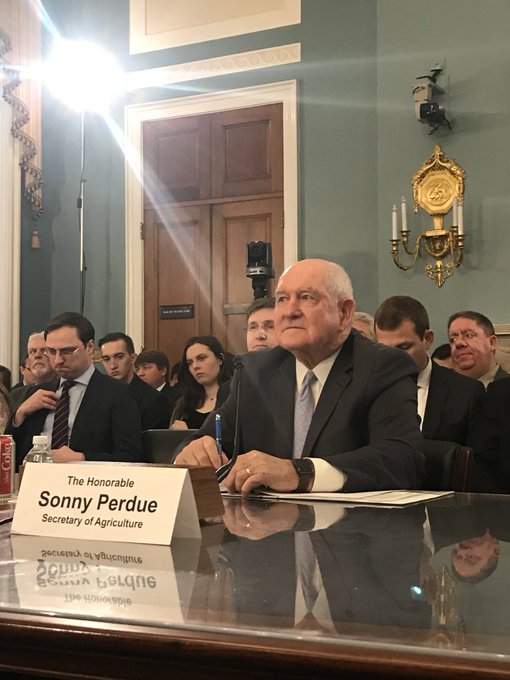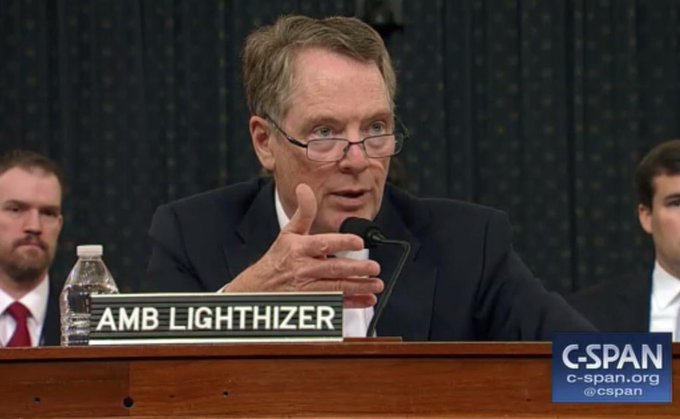At House Ag Committee, Secretary Perdue Addresses the State of the Rural Economy
 Secretary of Agriculture Sonny Perdue testified on Wednesday before the House Agriculture Committee at a hearing titled, “The State of the Rural Economy.” Lawmakers explored a variety of issues in their discussion with Secretary Perdue, including the condition of the agricultural economy, trade, and African swine fever. Today’s update provides some highlights from the Ag Committee meeting with Secretary Perdue.
Secretary of Agriculture Sonny Perdue testified on Wednesday before the House Agriculture Committee at a hearing titled, “The State of the Rural Economy.” Lawmakers explored a variety of issues in their discussion with Secretary Perdue, including the condition of the agricultural economy, trade, and African swine fever. Today’s update provides some highlights from the Ag Committee meeting with Secretary Perdue.
Agricultural Economy
During his opening statement Wednesday, Sec. Perdue pointed out that, “Net farm income has fallen nearly 50 percent from its peak in 2013, as most commodity prices have fallen over the past 5 years while global stock levels have rebounded with several years of record production.
Farm Income And Wealth: Trends in Financial Stress. USDA 2019 Agricultural Outlook Forum February 21, 2019 (Greg Lyons Economic Research Service, USDA).
“We saw the largest U.S. soybean crop ever in 2017 and again in 2018, U.S. corn production was the second highest ever in 2017 and third highest ever in 2018. However, other countries have also seen high production numbers.
In 2019, global production will continue to expand, trade challenges will persist, and these factors will continue to impact commodity prices.
Sec. Perdue added that, “Our Chief Economist at USDA calculated that working capital has decreased by 70 percent since 2012. However, total cash receipts are forecast to be slightly higher in 2019 across crop and livestock commodities and average net farm income is forecast to be higher in 2019 compared to 2018.”
More specifically, Sec. Perdue stated: “Looking forward, USDA projects 2019 net farm income at $77.6 billion, a $14 billion increase from the projections made last year.”
Reuters writer Humeyra Pamuk reported Wednesday that, “The amount of debt held by America’s farmers has risen rapidly to 1980s-levels at $409 billion from $385 billion last year, with loan demand remaining ‘historically high,’ U.S. Agriculture Secretary Sonny Perdue said on Wednesday.”
Farm Income And Wealth: Trends in Financial Stress. USDA 2019 Agricultural Outlook Forum February 21, 2019 (Greg Lyons Economic Research Service, USDA).
The Reuters article noted that, “But [Sec. Perdue] added: “Relatively firm land values have kept farmer debt-to-asset levels low by historical standards at 13.5 percent, and continued low interest rates have kept the cost of borrowing relatively affordable.”
Growth of large farms and financial risk in U.S. agriculture. USDA 2019 Agricultural Outlook Forum February 21, 2019 (Christopher Burns USDA Economic Research Service).
“USDA chief economist Robert Johansson said late last week that the U.S. Department of Agriculture is concerned about a potential future decline in farmland real estate prices, a key pillar of equity for the U.S. agricultural heartland, but has seen no sign of that happening so far,” the Reuters article said.
Meanwhile, in his opening remarks at the hearing, Committee Chairman Collin Peterson (D., Minn.) explained that,
[Farm] incomes continue to decline, wins on trade have yet to materialize, credit and capital are becoming harder to obtain, and folks are deciding it’s easier to sell the farm and move to the city than to continue trying to grind out a living.
Ranking Member Mike Conaway (R., Tex) indicated in his opening statement that, “Mr. Secretary, I know you are also working hard to ensure that there is a successful resolution very soon to the ongoing trade dispute with China — a resolution that will help level the playing field for the United States and require China to live by the same rules we do. During this process, I greatly appreciate the initiative you took to provide farmers and ranchers with the Market Facilitation Program to help them weather the unjustified retaliatory tariffs that have been imposed.”
Trade Issues- China
Rep. Vicky Hartzler (R., Mo.) indicated in her remarks at the hearing that, “Your tweet on Friday about the commitment from the Chinese to purchase ten million tons of soybeans was great news. Can we look forward to purchase commitments on other commodities like ethanol and DDGs, as part of the negotiations?”
Sec. Perdue noted that, “I sure hope so. I’ll give you a cute anecdote that happened in the meeting there. When the Vice Premier He gave that commitment, the President said Sonny, go out and tell your famers that we’ve got ten million more bushels. That’s a big deal, right? I said, yes Mr. President. He said, go and tell them. I kept sitting there, I did not leave. And he said, aren’t you going to go tell them? I said no, I’m hoping there’ll be more. And the Vice Premier looked at me, said there’ll be more.
We’re optimistic. We have to be cautiously optimistic. These negotiations are never over until they’re over, with the Chinese. And we’ve got a lot of details, a lot of frankly hurdles in order to get there.
Meanwhile, Rep. Angie Craig (D., Minn.) queried: “I worked in business for over 22 years, so I’m new to government here, but it’s often the case that once you lose some of these big countries, from a trade perspective, it’s awfully hard to get them back. So Chinese importers of U.S. grains may look elsewhere. I know we have some soybean issues. Do you believe our farmers will be able to get back these markets once we lose them?”
“Yes, I had that same fear initially, that you referred to. I have since become much more optimistic about that, primarily because of the China discussions and the kind of numbers that we see there,” Sec. Perdue said in response.
He added that, “I know there’s a fear that you lose a market, and it takes a long time to get it back. While other people do look other places for a diversity of options they have, just as we look for a diversity of options in our personal shopping. I think the good news is the U.S. still provides the most reliable, the most abundant, the safest, the best quality food supply there is in the world.”
“Well Mr. Secretary, for the sake of our farmers, I sure hope you’re right,” Rep. Craig replied.
As a side note on China, Wall Street Journal writers Bob Davis and William Mauldin reported Wednesday that, “U.S. Trade Representative Robert Lighthizer said that the trade deal he is negotiating with China would include a complicated enforcement mechanism that would involve regular consultations with Beijing and reserve the U.S. the right to assess tariffs for Chinese failure to carry out pledges.
“Mr. Lighthizer sketched out the enforcement process the two sides are considering in testimony before the House Ways and Means Committee.
After his testimony, Mr. Lighthizer also said the U.S. would take steps to formally abandon plans to increase tariffs on $200 billion of Chinese goods to 25%, from 10% now, while the two sides continue talking.
“President Trump indicated Sunday that the tariff hike, which could have taken effect at 12:01 a. m. Saturday, would be suspended.”
Trade Issues- USMCA, and Section 232 Tariffs
Ranking Member Mike Conaway asked Sec. Perdue for his perceptive on the United States- Canada- Mexico trade agreement (USMCA), and Sec. Perdue stated that, “I think if you remember, when we began this process, there was sort of a big sucking sound from all of agriculture in the U.S. that said oh no, don’t withdraw. NAFTA has been relatively good for agriculture. And I think we would agree with that.”
Sec. Perdue added that, “And I think if one is honest and objective, and looking at the USMCA agreement, basically in every sector, and every section and every chapter, you will find an improved agreement…But I think all in all, the USMCA agreement is improved, and I hope that we can all look at the objectivity of it, and understand this is in the best interest of the United States of America economy, and vote for its ratification.”
Also with respect to the USMCA, the following tweet occurred during Amb. Lighthizer’s testimony before the House Ways and Means Committee:
Meanwhile, on the issue of the Section 232 aluminum and steel tariffs, Rep. Jim Costa (D., Calif.) stated that, “Last week Canadian Ambassador David MacNaughton, to the United States and White House Economic Advisor Larry Kudlow, predicted that the administration could remove Section 232 tariffs on steel and aluminum in a matter of weeks. Mr. Secretary I don’t need to tell you that the retaliation of U.S. Agriculture as a result of these tariffs have been incredibly difficult to our producers.”
Rep. Costa added, “So my question to you is, whether the pursuing new markets and trade deals, which we need to do with Japan and we need to resolve with China, where are we, with regards to USMCA and these 232 tariffs?”
Sec. Perdue responded by saying, “I think again, the removal of the tariffs I think is in the interest of all, and we’re advocating to the administration to do that…[and] I think what we’re moving toward is a resolution over the tariffs, possibly to be replaced by reasonable quotas, with which Canada and Mexico can live and have the retaliatory tariffs removed.”
Again, the following tweet on this issue occurred during Amb. Lighthizer’s Ways and Means Committee testimony:
African Swine Fever
Chairman Peterson (D., Minn.) indicated at Wednesday’s hearing that, “I had talked to you, a month ago or so, about this [African] swine fever situation in China. And my constituents are still very concerned about this. They’re worried about grandmothers bringing meat in from China. Has there been any significant upgrade at the airports, with these flights that are coming in from mainland China? To make sure that we don’t have this potential swine fever coming in? As I understand it, it’s decimated the hog industry in China. If this gets in the United States, it’s going to put us out of business. Are we on the ball here?”
Sec. Perdue stated that, “Well, I think we are. But there’s no doubt, in these kind of transmissible diseases and the mobility of society today, there’s no way to guarantee that Mr. Chairman. But I think APHIS, our Animal Plant Health Inspection Service, is on the job at borders. Working hand in glove with our customs and border patrol, using obviously dogs, rescue beagles, in order to sniff out incoming travelers from internationally, particularly in those areas that we fear.
“But the pest transmission, both of animal and plant, is a real concern always. We’re ever vigilant about that. We feel that we’ve got a good protocol in place. We’re working both with our primary threats, although there are no evidence of African swine fever in Canada or Mexico, you know that we both enjoy very long borders, and fairly porous borders with each. And that’s a concern. So we work with those countries. We are going to Ottawa in the end of May to again, collaborate on our protocols, making sure that we’re all aware and doing the same thing. Awareness is the first key. But inspection and checking is second. I think we’re doing that. Something like this, there’s just no way to guarantee. But I believe we’re doing everything possible at this time to be as preventive as possible in a very devastating disease.
“It’s the mobility of our swine population in the United States, as you well know from your area. Many of these pigs are born elsewhere and they’re transferred to be fed out in other parts of the country. And there are a lot of pigs on the road at any given time, which makes this very difficult. Unlike maybe a regionalization, or a concept in poultry, where you can more identify and encapsulate, the mobility of our pig population makes that more difficult. But I believe we’re doing everything we can.”
Source: Keith Good, Farm Policy News








